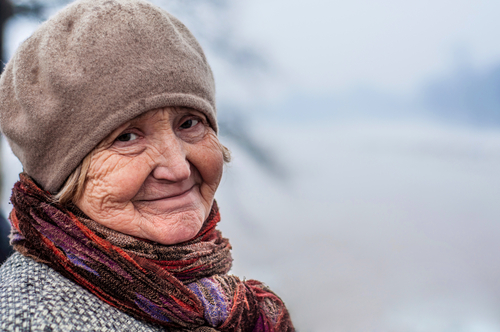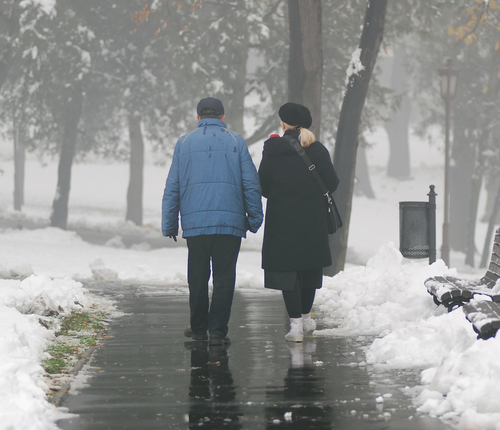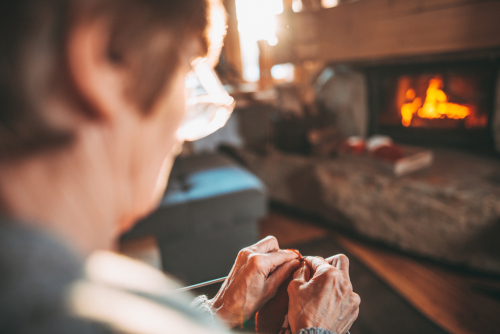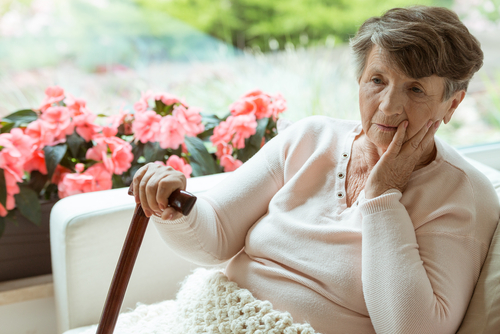With winter and the colder temperatures upon us, we all are taking the necessary precautions for our health, safety and care. However for our loved ones living with Alzheimer’s, winter can also be the most dangerous season of the year. Given that they face different challenges that might require specialized care, complications can be severe during this season. Therefore, it is important that the caretakers of those living with Alzheimer’s and dementia understand and review some special care tips for their loved ones during these cold, weather months.
Based on various situations we face throughout this season, here are some tips on how we can help our loved ones handle the colder temperatures, snow, ice and other hazards that might occur during these months.
Preventing Hypothermia: Dressing For Warmth
There is an increased concern for issues related to hypothermia throughout the winter, especially among those living with Alzheimer’s and dementia. Hypothermia can cause serious repercussions such as memory loss, exhaustion, slurred speech and more. To prevent issues with hypothermia in the cold weather months, caregivers will want to make sure their loved ones are dressed properly using many extra layers.
Alzheimer’s patients are often unaware of temperature and weather changes, or simply may not know how to properly dress themselves. Since our elderly loved ones are often unable to exercise, and sometimes experience a reduction in appetite, warmer clothing is necessary to fortify them against the cold elements.
Watch For Ice: Keeping Close Watch To Prevent Falling
In winter, the harsh environment puts your loved one’s well-being in a delicate position. During the cold winter months, snow and ice often becomes an issue. It is also extremely important for caretakers to be aware of ice, snow and wet ground to prevent falls with Alzheimer’s patients. Those with dementia may not be cognitively aware enough to realize there is ice on the ground, or they may not know how to properly walk on the ice to prevent falling. To prevent injuries such as slipping on ice (as sidewalks, parking lots and roads become increasingly slippery,) always assist and never take your eyes off a person with Alzheimer’s for an extended period of time while outdoors to ensure their safety.
Maintaining Health And A Balanced Diet
A healthy routine and lifestyle is especially important for older people during the colder months. Ensuring a nutritional diet for those living with Alzheimer’s is particularly important throughout the cold, virus, pneumonia and severe flu season that typically occurs during wintertime. Make sure your loved ones are eating enough and monitor that they are eating a healthy and well balanced diet. Also check that they are taking their medications, drinking plenty of fluids, and maintaining a regimen of appropriate vitamins and supplements that can only help to strengthen them against winter illnesses. For senior in particular, these illnesses can often be deadly – so extra attention to your loved ones health is vital.
Indoor Heating Safety Tips
Many times Alzheimer’s patients who are living in memory care or assisted living facilities will try to use a space heater in order to effectively heat their individual rooms. However, the hidden dangers involved in indoor heating safety should not be overlooked. Space heaters can be a great alternative to staying warm, but they also can pose a fire hazard. Except in cases of emergencies, space heaters should never be used in a home where a person with Alzheimer’s lives; statistics have show that they account for the majority or fires during winter months. While it is true that most modern space heaters are designed to shut off in dangerous situations, such safety measures are simply not guaranteed.
Having carbon monoxide detection and smoke detectors around the house are particularly important, since typical warning signs such as smoke or chemical smells may not be as obviously noticed by those living with Alzheimer’s.
Additionally, other items such as electric blankets can also cause issues by becoming too hot and potentially burning the skin and causing overheating. Family and caretakers will want to make sure that they are paying extra close attention to their loved ones and checking on other things such as furnaces, stoves, fireplaces and more.
Other Issues to Look Out For: Wandering
Keeping watch over elderly ones with Alzheimer’s is always of utmost importance, but especially in winter. Our loved ones may be unaware of their own discomfort and environment and may become increasingly disoriented. This can lead to a tendency to sneak out, also called “wandering,” which is dangerous no matter what time of year. Statistics state that 6 in 10 people with Alzheimer’s disease will wander, and a person living with Alzheimer’s or other dementia may not remember his or her name or address, and can become disoriented, even in familiar places.
In wintertime, wandering can be even more dangerous for dementia patients as they may accidentally slip and fall and sustain serious injuries. In cold temperatures and winter weather conditions, wandering can be life threatening – and is a significant safety concern.
Therefore, it is important to keep your loved ones safe by taking simple precautions to prevent wandering:
- Avoid busy places such as shopping malls and grocery stores, as they can easily be confusing and cause disorientation.
- Place locks out of sight; for example, use slide bolts at the top or bottom of doors.
- Camouflage doors by covering them with removable curtains or screens, or painting them the same color as walls. In addition, covering door knobs with cloth in the color of the door or using childproof knobs is useful.
- Prevent wandering at night by restricting fluids before bedtime and ensuring your loved one has used the bathroom before bed. Using night lights throughout the home or facility is also very helpful.
- Use monitoring devices or motion detectors that signal when a door or window is opened, and to send an alert of movement.
- Keep routine but provide structure; some of those living with Alzheimer’s will not go out without their wallet, coat, certain hats, etc. But by making these items unavailable, you can prevent the occurrence of wandering.
Additionally, since staying home due to extreme weather conditions is more common at this time of year, planning ahead for situations that may put your loved one in danger is imperative:
- Keep a list of places where the person may wander, i.e., past jobs, former homes, places of worship, or favorite restaurants.
- Keep a list of names and numbers for your loved ones to call if feeling confused or overwhelmed.
- Provide telephone numbers in one location and make it easily accessible.
- Inform neighbors, friends and family of your loved ones situation; and ask them to call if they see the person alone and acting or dressed unusually.
- Always keep a recent photo and updated medical information on hand to give to police in case your loved one wanders.
- Determine areas in the neighborhood near the home that may be of concern; such as roads with heavy traffic, open bodies of water, stairwells, tunnels, bus stops or train stations.





